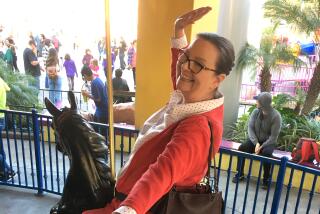Cancer Survivors Help Others Through It : Health: New Jersey program matches patients with those who have successfully battled disease. Their counsel is credited with reversing the depression that often accompanies chemotherapy and radiation.
- Share via
WESTFIELD, N.J. — Kate is 44 years old and looks the picture of health after a bout with cancer last year. She attributes much of her strength to a program that matches cancer survivors with those about to undergo treatment.
The privately supported CHEMOcare program supported Kate when she was diagnosed with cervical and uterine cancer; now, she’ll be able to support someone who faces the same treatment she did.
So will Ed, a 62-year-old man who jokes that his biggest concern is his weight gain after surviving prostate cancer.
“I felt I got a second chance,” he said in an interview in CHEMOcare’s small basement office. “It imposes not an obligation, but a desire to help. . . . Our method is to tell them we survived.”
The program provides each patient with three contacts by phone or in person with one of its 150 “support people” who has been through the same treatment the patient will undergo.
Last names of the support people are kept confidential; the program does not want the patients to become overly dependent on their supporters. But professionals who work with cancer patients in about half of New Jersey’s 85 acute care hospitals say the three contacts are enough to reverse the depression that accompanies chemotherapy or radiation.
Physical effects can include nausea, mouth sores, diarrhea, hair loss and stomach cramps. The psychological effects of friends and family turning away in fear can be just as devastating, survivors say.
“(The survivors) provide our patients with support from others who have gone through the same treatment,” said Mary DeSane, the cancer program coordinator at Jersey Shore Medical Center in Neptune.
“The support these patients receive is invaluable and can’t be replaced,” said Eileen Werbel, a social worker at University Hospital in Newark.
CHEMOcare executive director Randi Schayowitz said the presence of survivors shows patients that they have not received a death sentence.
“They don’t look like walking skeletons,” Schayowitz said. “They’re alive and active.”
Officials with the American Cancer Society say they offer a similar program nationwide for breast cancer, but state and national officials say they know of no other program that matches patients by treatment.
Program founder Diane Outcault, now the administrative director of the oncology program at Elizabeth General Medical Center, said someone who has been through the treatment has natural advantages over doctors and nurses when it comes to providing a sympathetic ear.
The key, Outcault and Schayowitz say, is steering the patient as quickly as possible toward realizing that recovery is possible.
“No matter how you look at it, it is tough,” said Jill, a 55-year-old support person who underwent chemotherapy more than a decade ago for breast cancer. “Maybe you get someone who would give up one or two treatments before it’s completed.”
“The hope was there. That was a major difference,” Kate said. “I could see the difference when I was going through my radiation. The doctors and nurses were shocked by my attitude of getting better.”
Schayowitz also said CHEMOcare helps patients who are wary of general support groups in which members can die, causing additional pain.
Jill said the nine-hour training session for applicants screens out those who are negative or still bitter about their own experiences. Support people are also told not to undermine doctors’ authority by raising questions about treatments.
“We’re like the guide dog leading the patient through what’s going to happen,” said Michelle, a 46-year-old woman who survived a bone-marrow transplant in 1990 after four years of chemotherapy for multiple myeloma. “We’re like the guide dog trying to keep them out of the same holes we fell into.”
Ron Czajkowski, a spokesman for the New Jersey Hospital Assn., said CHEMOcare will gain in importance with the changes in health care that seek to reduce a patient’s average weeklong hospital stay in favor of alternative programs.
“It makes sense for this kind of hand-in-glove arrangement between hospitals and support groups to make sure patients get the information they need and the support from people who survived cancer,” he said.
More to Read
Sign up for Essential California
The most important California stories and recommendations in your inbox every morning.
You may occasionally receive promotional content from the Los Angeles Times.













